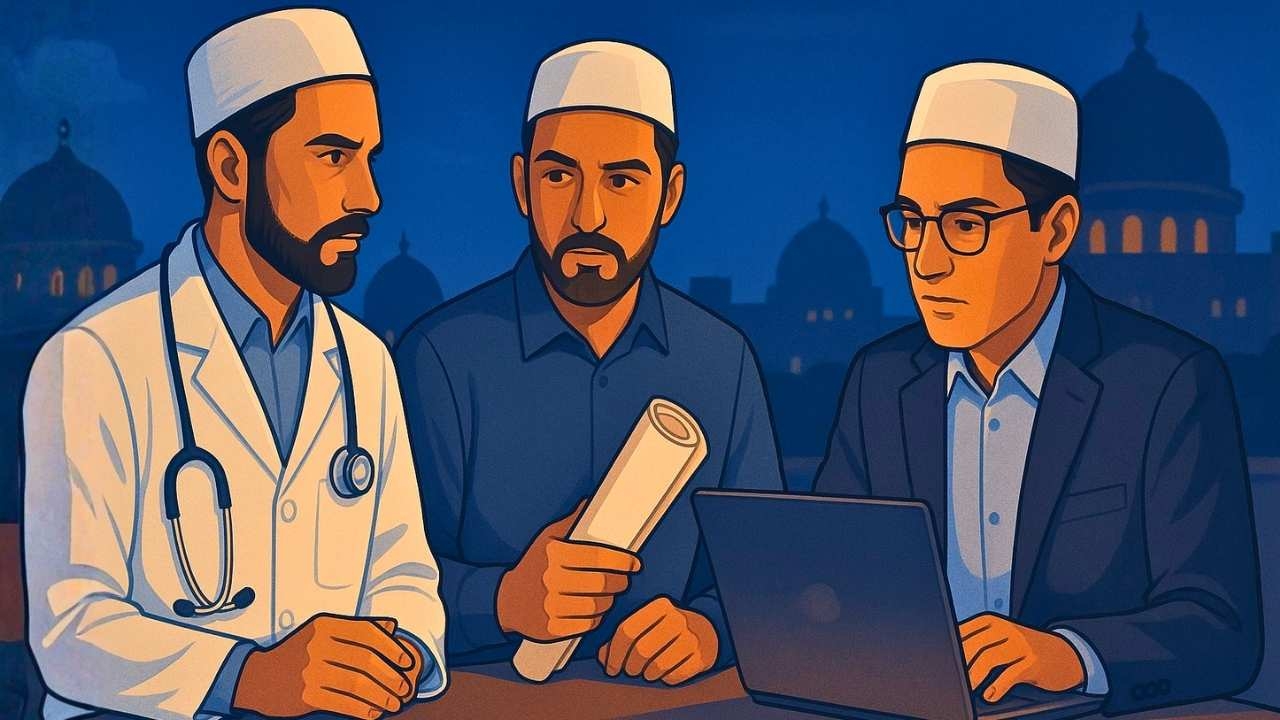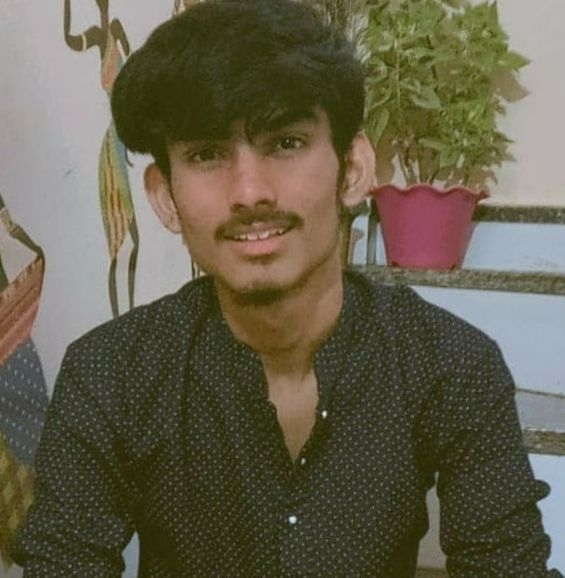Educated Radicals: The Rise of White-Collar Jihad in Bharat
A new pattern of radicalisation among doctors, engineers and scholars shows how extremist groups exploit education and influence to evade detection and strengthen their operations.
Total Views |

A chilling revelation has placed the national security establishment on high alert after investigators uncovered a white-collar terror network involving doctors, clerics, and professionals allegedly working for Islamic terror outfits.
For decades, Bharat’s counter terror narrative centred on infiltrators, madrasas, and training camps across the border. However, a disturbing trend has emerged over the past two decades, one that has become even more prominent with recent developments. These individuals do not wear fatigues or carry AK 47 rifles. Instead, they conceal themselves behind lab coats, university identities, and corporate badges.
This phenomenon marks a dangerous evolution in Islamist extremism. In contrast to the conventional image of uneducated militants, modern jihadist networks increasingly recruit doctors, engineers, professors, and IT professionals. These are individuals with intellect, access, and influence. Between 2001 and 2025, several highly qualified individuals across Bharat and abroad were found aiding terror groups such as Jaish e Mohammed, Hizbul Mujahideen, ISIS, and Al Qaeda. These white collar radicals use their technical expertise for encryption, funding, propaganda, and cyber warfare.
Universities, online platforms, and religious discussion groups have become new breeding grounds for ideological indoctrination, where extremist narratives are often disguised as identity politics or resistance. This educated radicalisation poses a profound challenge. It transforms skilled citizens into ideological weapons, making terrorism more sophisticated, more decentralised, and far harder to trace. Countering this threat requires ideological vigilance as much as military or intelligence response.
The following report examines thirty six incidents that reveal the gruesome impact of jihad executed through intellect and influence.
1. Dr Rajsmeem Shakeel (Faridabad, 2025)
A medical doctor arrested by Haryana Police for alleged involvement with a proscribed terror outfit. Reports point to links with online jihadi forums and radical preaching groups.
2. Dr Shaheen Shahid (Delhi, 2024)
MBBS graduate accused of providing logistical assistance to ISIS modules operating through encrypted platforms. Investigations exposed her role in radical recruitment through social media.
3. Dr Alid Ahmad (Kolkata, 2023)
A practising physician discovered transferring funds to an Al Qaeda in the Indian Subcontinent sleeper cell. He claimed ideological motivation rather than material gain.
4. Dr Usama Maj (Kerala, 2022)
An orthopaedic surgeon radicalised during medical college. He left a prestigious job to join ISIS Khorasan and was killed in Afghanistan in 2022.
5. Dr Fahim Ansari (Mumbai, 2021)
A physician and lecturer charged with running a covert Telegram channel sharing bomb making manuals and Islamist propaganda.
6. Dr Azhar Mahsood (Hyderabad, 2020)
A renowned pathologist with ties to SIMI. He provided safehouses to fugitive operatives.
7. Dr Muzaffar Ul Haq (Jammu, 2019)
A Kashmiri medical scholar arrested for aiding Jaish e Mohammed terrorists after the Pulwama attack by supplying medical aid and shelter.
8. Dr Bilal Asgar (Srinagar, 2018)
A dentist known for online radical sermons supporting ISIS ideology. He was monitored by the NIA for cross border communication.
9. Dr Abdullah Khan (Delhi, 2017)
A cardiologist turned radical preacher who spread anti state ideology in private religious sessions. Links were uncovered to Hizb ul Tahrir.
10. Dr Nasir Wani (Shopian, 2016)
A medical student who joined Hizbul Mujahideen under the influence of Burhan Wani. He was killed in an encounter and later used as a propaganda figure online.
11. Engineer Ahmad Mujja Abbasi (Hyderabad, 2025)
A chemical engineer from IIT linked to the technical wing of ISIS. He created encrypted communication devices for militants.
12. Engineer Jubair Hunggek (Kerala, 2024)
A software engineer arrested for designing malware used by radical groups for fund transfers and recruitment.
13. Mansoor Asgar (Bangalore, 2023)
A Yahoo software engineer who became a cyber jihadist. He handled pro ISIS Twitter accounts and dark web propaganda platforms.
14. Engineer Omar Atta (Egypt, USA, 2001)
A civil engineer and key hijacker involved in the 9 11 attacks. Trained at Hamburg University, he demonstrated how Western educated professionals formed the core of global jihad operations.
15. Engineer Riyaz Bhatkal (Mumbai, 2008)
A mechanical engineer and co founder of Indian Mujahideen. He masterminded several serial bombings between 2008 and 2013.
16. Engineer Mohammed Sadiq (Bhopal, 2015)
A civil engineer involved in the reactivation of SIMI. Arrested for plotting sabotage of railway infrastructure.
17. Engineer Abdul Rahim (Coimbatore, 2016)
An electronics engineer who fabricated IED circuits used by ISIS inspired modules in Tamil Nadu.
18. Engineer Saifullah (Lucknow, 2017)
A mechanical engineer turned militant killed in a Lucknow ISIS encounter. Found with jihad literature and weapon manuals.
19. Engineer Mohsin Shaikh (Pune, 2018)
A computer engineer accused of data theft and cryptocurrency funneling for ISIS K.
20. Engineer Umar Bin Hafiz (Delhi, 2020)
An AI specialist working at a multinational firm. Indoctrinated online, he supplied AI based encryption tools to foreign handlers.
21. Manan Bashir Wani (Hizbul Commander, 2018)
A PhD scholar at Aligarh Muslim University who left academia to join Hizbul Mujahideen. Killed in an encounter and turned into a social media martyr figure.
22. Professor Mohammad Rafiq (Kashmir University, 2019)
A political science professor dismissed for promoting extremist literature. Later charged for inciting students to join militancy.
23. Professor Saleem Khan (Delhi University, 2017)
A lecturer accused of acting as an ideologue for SIMI and delivering radical sermons disguised as academic lectures.
24. Professor Afzal Guru (J and K, 2001)
A medical dropout turned political activist. Convicted for his role in the 2001 Parliament attack executed by Jaish e Mohammed.
25. Professor Zakir Naik (Mumbai, 2016)
A medical doctor turned preacher whose speeches allegedly inspired several terrorists, including the Dhaka attackers. He currently resides abroad and faces money laundering and hate speech charges.
26. Dr Mohd Asim (Hyderabad, 2021)
A medical professor accused of running an underground radical discussion forum in universities.
27. Hafiz Muhammad Saeed (Pakistan, 1999 to 2019)
An engineer and Islamic studies professor. Founder of Lashkar e Taiba and Jamaat ud Dawa and mastermind of the 26 11 Mumbai attacks.
28. Masood Azhar (Pakistan, 2000 to present)
A religious scholar and founder of Jaish e Mohammed. Planner of the Pathankot, Pulwama, and Parliament attacks.
29. Mohammad Saeed (Karachi, 2014)
A chartered accountant managing the terror funding networks of LeT and JeM through NGOs and shell companies.
30. Yakub Memon (Mumbai, 1993)
A chartered accountant and key financier of the 1993 Mumbai blasts. Educated and sophisticated, yet ideologically driven by revenge and religion.
31. Syed Zafar Hussain (Lucknow, 2019)
An MBA graduate operating an ISIS propaganda media cell known as Ansar Gazette. Arrested for recruiting educated youth.
32. Areeb Majeed (Thane, 2014)
A civil engineering student who joined ISIS in Iraq. Later surrendered and revealed deep insights into radicalisation processes.
33. Abdul Subhan Qureshi (Mumbai, 2018)
A software engineer known as Bharat’s Bin Laden. Founder of the tech wing of Indian Mujahideen and involved in the 2008 Ahmedabad blasts.
34. Mohammad Khalid (Hyderabad, 2020)
A data analyst and cyber expert radicalised online. He provided online encryption classes to ISIS handlers.
35. Faisal Al Sheikh (Mumbai, 2006)
A computer technician and mastermind of the Mumbai train blasts. Worked closely with Lashkar e Taiba.
36. Dr Rahil Sheikh (Aurangabad, 2006)
A medical professional and SIMI cadre who facilitated the transport of explosives for the Mumbai blast network.
In a Nutshell
This pattern shows how skilled people used education and trusted roles to help violent jihadist groups. Their actions made networks harder to track and more dangerous. Stronger awareness, careful checks and early detection are needed to stop such hidden radicalisation from growing further.
Report by

Kewali Kabir Jain
Journalism Student, Makhanlal Chaturvedi National University of Journalism and Communication

